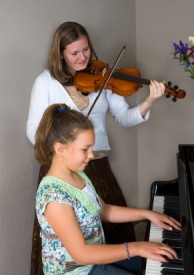
The debate over music and its benefits for the development of early cognitive abilities have raged now for almost two decades. Can classical music transform children into smarter, more effective learners? Today's research indicates that the clear answer is that this is the wrong question. The question is this: What are the differences in the effects of passively listening to music vs. active musical training upon cognitive abilities?
On passive listening
Ever since French researcher Dr. Alfred A. Tomatis, in his 1991 book Pourquoi Mozart?, put forth the assertion that listening to the music of Mozart can retrain the brain, laypeople and researchers alike have been on the hunt for evidence to support his claims. Two years later, University of California at Irvine psychologist Frances H. Rauscher reported findings demonstrating that passivelylistening to Mozart's music enhanced college students' cognitive abilities. (Such claims gave rise to numerous products that were aggressively marketed to parents, the most popular being the highly scrutinized Baby Einstein series. See this 2009 article in the NY Times.)
While they garnered a fantastic amount of attention, researchers around the world have been highly skeptical of Rauscher's conclusions. Today, numerous studies have demonstrated that, alas, passively listeningto music will not transform babies' brains into mini computational powerhouses. See this May 10, 2010 article in Science News.
On active training
All this does not translate to the conclusion that there is no educational benefit to music. I'm happy to report that activemusical training, such as taking formal lessons in learning to play the piano or read music, does produce substantive positive changes in the brain in children as well as adults. As we know, the brain is plastic; it changes based on how it is exercised. (That is why we talk so much about brain fitnessat Scientific Learning.)
In contrast to Tomatis and Raucher's work in passive musical listening, last year a team of European researchers published a study entitled, " Musical Training Influences Linguistic Abilities in 8-Year-Old Children: More Evidence for Brain Plasticity." Researchers tested thirty-two non-musician children over nine months to look at their predispositions for music, as well as to measure the effects of musical training upon non-musical functions.
Remarkably, they found that just six months formal musical training had positive affects upon subjects' abilities in speech. Specifically, subjects' musically trained ears allowed them to better discern differences in pitch. Further, this research supported the idea of brain plasticity in showing that even short periods of training the brain can have large effects upon brain function.
But how does musical training affect language processing in adults? Again, the research clearly outlines the positive affects, demonstrating that brain plasticity continues on through adulthood:
- Schon, Magne and Besson published in 2004demonstrated that training helps adults process not only music, but also speech. In studying the perception of fundamental frequency--the lowest threshold of audible tones--in eighteen musicians and non-musicians (mean age of 31), results showed that extensive musical training does have a clear affect on "the perception of pitch contour in spoken language."
- The research from Gabb, Tallal, Kim, Laskminarayanan, Archie, Glover and Gabrielasuggests that musical training actually "changes the neural network involved in rapid spectrotemporal processing so that it overlaps primarily with brain areas traditionally associated with language processing (e.g., Broca's region)."
The significance of all this research is clear; don't just listen to the music. Take up producing your own and you'll be rewarded with all that music has to offer, while gaining improved brain function as a bonus.

